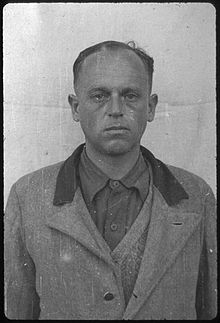Fritz Hintermayer
Fritz Hintermayer (born October 28, 1911 in Grafing near Munich ; † May 29, 1946 in Landsberg am Lech ) was a German medic and SS-Obersturmbannführer . He was also an SS doctor and, most recently, a camp doctor in the Dachau concentration camp .
SS career
Hintermayer, married and the father of four children, was a member of the NSDAP ( membership number 1.200.381) and the SS (membership number 310.340). He belonged to the SS Totenkopf Division . From 1938 he was deployed in the Oranienburg concentration camp . In July 1941 he was promoted to SS-Hauptsturmführer while serving with the SS-Totenkopf-Infanterie-Regiment 2 . His promotion to SS-Sturmbannführer took place in October 1943 while he was employed in the SS Panzer Grenadier Regiment 5 "Totenkopf". From February 1944 he was first deputy of the then camp doctor Wilhelm Witteler in the Dachau concentration camp , and from September 1944 to April 1945 he held this leadership position himself, most recently with the rank of SS Obersturmbannführer. In the trial before the US military tribunal, Hintermayer stated that he had been a doctor in an SS combat unit on the Russian front before his last transfer to the Dachau concentration camp, where he sustained a severe head wound with significant consequences. He also stated that he himself did not feel suitable for the position of senior camp doctor in Dachau and that he had also informed his superior, the head of the Office D III Sanitary and Camp Hygiene in the SS Economic and Administrative Main Office , SS Standartenführer Enno Lolling . Various sources indicate that Hintermayer had not yet finished his doctoral process at the end of his work as a camp doctor .
Medical crimes
As a concentration camp doctor - especially in his managerial role as a camp doctor - Hintermayer had overall responsibility for health protection and the comprehensive medical and medical care of the prisoners in the Dachau concentration camp. In addition, he was responsible for various "medical" auxiliary services for the concentration camp administration, medical research centers and commercial enterprises, which served the systematic exploitation , mistreatment , torture and extermination of prisoners in the sense of National Socialist ideology . These activities were z. B. the selection of prisoners for various measures and human experiments , certificates for the preparation and execution of corporal punishments, assistance with executions , cover-up of killings with falsified death certificates , execution of forced abortions , instructions on the killings of certain prisoners. In the first Dachau trial , Hintermayer generally recognized the inadequate organization and implementation of medical and medical care for prisoners during his time as a camp doctor, the acceptance of the massive suffering and death of prisoners as a result of systematic shortages and various epidemics , his planned participation in crimes by third parties against the Accused of concentration camp prisoners as well as concrete actions against the life and limb of concentration camp prisoners. Hintermayer was described by prisoners as corrupt and a murderer . The former German prisoner Eugen Seybold testified u. a. that Hintermayer killed two pregnant Russian women with injections . According to statements made by the former Czech prisoner doctor Franz Blaha on January 9, 1946 in Nuremberg , Hintermayer was involved in salt water experiments and air pressure experiments on a large number of concentration camp inmates who, as a rule, were associated with severe physical and mental injuries for the test subjects , and mostly with theirs Death ended. There are also statements that in April 1945 von Hintermayer killed eighteen mentally ill young prisoners by injections. Hintermayer said he was involved in malaria attempts .
Conviction and execution by the US occupation authorities
Fritz Hintermayer was after the liberation of the Dachau concentration camp in Dachau main process , in response to the Dachau trials , held with 39 other management or team members of the Dachau concentration camp for war crimes accused. He was sentenced to death on December 13, 1945 for what he had done in Dachau . In the judgment, Hintermayer's individual acts of excess were taken into account: participation in executions to determine the death of the executed, the administration of two fatal injections to two pregnant inmate women and the preparation for the killing of seven mentally ill inmates. The judgment was confirmed on April 5, 1946 by the Commander-in-Chief of the American Armed Forces in Europe , who had received a recommendation from a so-called "Review Board" of the army. His death sentence was carried out on May 29, 1946 in the Landsberg War Crimes Prison by hanging.
Individual evidence
- ^ Holger Lessing: The first Dachau trial (1945/46). Baden-Baden 1993, p. 320.
literature
- Holger Lessing: The first Dachau trial (1945/46). Nomos Verlagsgesellschaft, Baden-Baden 1993, ISBN 3-7890-2933-5 .
- Ernst Klee : The dictionary of persons on the Third Reich: Who was what before and after 1945. Fischer-Taschenbuch-Verlag, Frankfurt am Main 2007, ISBN 978-3-596-16048-8 .
swell
- Testimonies from former Dachau prisoners In: Horace R. Hansen: Witness to Barbarism. Thousand Pinetree Press, Gray Eagle, MN 2002, ISBN 0-9720849-0-8 , pp. 214-215, 240, 271, 115.
- Process documents from the first Dachau trial (US283, Case No. 000-50-2, US vs Martin Gottfried Weiss et al) (English)
| personal data | |
|---|---|
| SURNAME | Hintermayer, Fritz |
| BRIEF DESCRIPTION | German physician and most recently camp doctor in the Dachau concentration camp with the rank of SS-Obersturmführer |
| DATE OF BIRTH | October 28, 1911 |
| PLACE OF BIRTH | Grafing near Munich |
| DATE OF DEATH | May 29, 1946 |
| Place of death | Landsberg am Lech |

